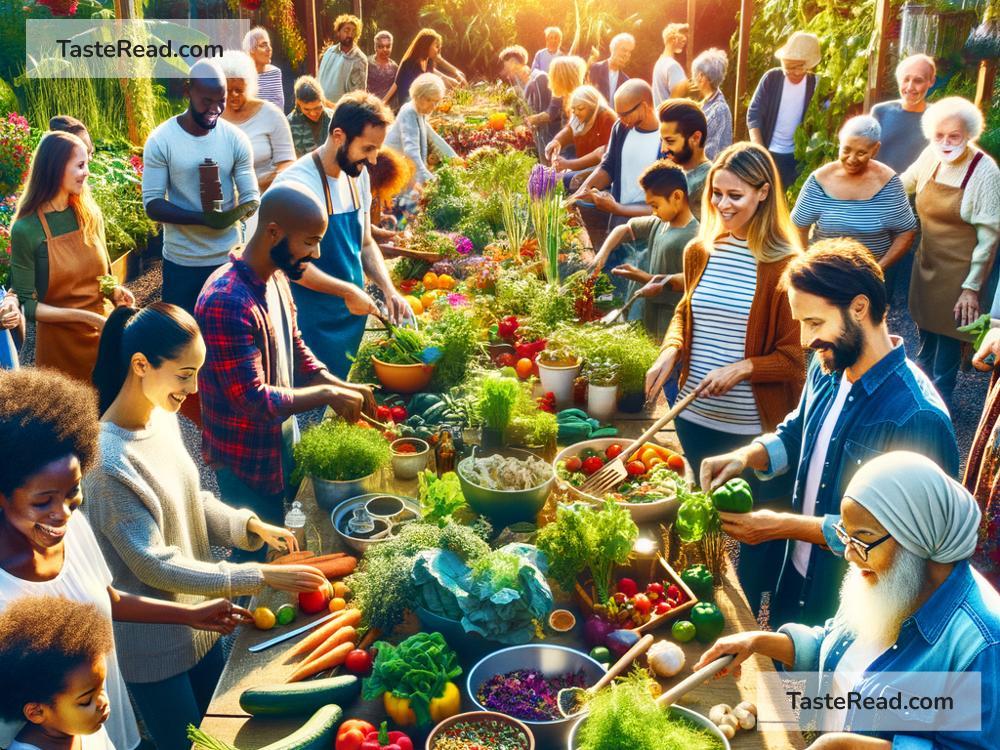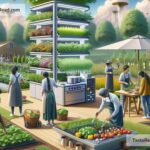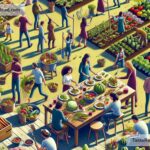The Future of Food and Community Empowerment
In today’s fast-changing world, food is about more than just feeding ourselves. It’s about creating connections, solving challenges, and building stronger communities. As we move toward the future, the way we think about food will play a major role in shaping our lives and creating opportunities for empowerment.
The Challenge: Feeding a Growing World
By 2050, the world’s population is expected to be nearly 10 billion people. That’s a lot of mouths to feed! Unfortunately, current methods of food production often harm the planet. Deforestation, soil erosion, and greenhouse gas emissions from industrial farming are putting stress on Earth’s resources. At the same time, many communities face food insecurity—either they don’t have enough food or the food available is unhealthy and expensive.
To solve these problems, we need to think differently about food. Not only must we find smarter ways to grow food sustainably, but we also need to ensure that everyone has access to nourishment. This means empowering communities to take control of their food systems.
A New Era of Food
The future of food is full of exciting possibilities. Innovations in technology, farming, and education are helping to create solutions that are healthy for both people and the planet.
1. Urban Farming and Vertical Agriculture
As cities grow larger, more people are living far away from traditional farms. Urban farming can bring food production closer to home. Vertical agriculture, a method of farming that uses stacked layers in skyscraper-like buildings, allows food to grow in a controlled environment using less land and water. Imagine a future where your neighborhood farm looks like a shiny building instead of fields in the countryside!
Urban farming also brings people together. Community gardens, rooftop farms, and indoor hydroponics teach people how to grow food, while providing a space to meet others, share knowledge, and form connections.
2. Local Food Movement
Buying food from big supermarkets often means eating items shipped from countries far away. This creates pollution and limits access to fresh produce. The future of food emphasizes the local food movement, where communities grow and sell food that comes from nearby farms or gardens.
Supporting local food ensures that farmers earn a fair income, reduces transportation costs, and allows people to enjoy fresh, nutritious meals. It also creates opportunities to revive traditional recipes and celebrate unique local flavors, preserving cultural heritage.
3. Plant-Based and Alternative Proteins
Another way the future of food is tackling sustainability is through plant-based diets and alternative proteins. Growing plants is often more environmentally friendly than raising livestock, which uses a lot of land and water. Food companies are developing creative ways to make plant-based burgers, sausages, and even “seafood” that taste just like the real thing.
For those who still want meat, lab-grown meat is becoming a reality. Scientists can now grow meat from animal cells without raising or killing animals. This process reduces harmful environmental impacts and could eventually make meat more affordable for everyone.
Empowering Communities Through Food
Food is much more than a necessity—it has the power to strengthen communities and build resilience in tough times. Here are some ways food can empower people and unite neighborhoods:
1. Education and Access
Teaching people how to grow their own food empowers them to be less dependent on expensive grocery stores. For instance, community workshops can teach families how to start a vegetable garden at home or compost leftover food to enrich the soil.
Schools can also incorporate food education in classrooms. Children can learn about nutrition, sustainability, and the importance of food justice. When kids understand where their meals come from, they appreciate their food and are inspired to care for the planet.
2. Support for Farmers and Small Businesses
Local farmers and food entrepreneurs deserve our support. Farmers markets, co-ops, and community-supported agriculture (CSA) programs connect customers directly to food growers, cutting out big corporations. By empowering farmers and small businesses, communities can create fair systems that allow everyone to benefit.
For example, in some cities, people can volunteer to help farmers harvest crops and receive fresh produce in exchange. This fosters teamwork and creates a sense of pride in participating directly in the food system.
3. Food Justice and Equality
Empowerment also means ensuring that all communities have equal access to food. Unfortunately, some areas (often low-income neighborhoods) are “food deserts,” meaning there are few places to buy affordable, healthy options.
Food justice organizations are working to address this issue by setting up mobile markets, creating free meal programs, and advocating for policy changes. The ultimate goal is to ensure that food is treated as a basic human right, not a privilege.
The Role of Technology
Technology will help us rethink how food is grown, delivered, and shared. Robots on farms, apps that connect neighbors to food-sharing networks, and 3D printers that “print” edible items are just some of the innovations shaping tomorrow’s food landscape.
But technology isn’t the only answer. We must combine technological tools with human connection and community-inspired action to truly empower people. When we involve communities in decisions about food, everyone feels ownership and pride in building a better future.
Conclusion
The future of food isn’t just about solving big global problems—it’s about making small changes that strengthen local communities. By growing food sustainably, supporting farmers, educating people, embracing innovative ideas, and fighting for food justice, we can create a world where everyone thrives.
Food doesn’t just nourish our bodies—it can create bonds, inspire creativity, and build a stronger and fairer society. Together, we have the power to turn challenges into opportunities and reimagine how food shapes our lives in the years to come.


